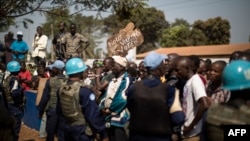Hundreds of protesters marched in Central African Republic's capital on Wednesday, demanding that peacekeepers arrest militia leaders opposed to upcoming elections.
Most of the marchers came from PK5, a besieged Muslim enclave visited by Pope Francis during his trip last month to Bangui, the capital. Heavy fighting took place in the district as residents voted in a constitutional referendum on Sunday.
"There are people who don't want peace and who use violence to sabotage the electoral process. We are asking the international forces to come drive these thugs from PK5," said Ousmane Abacar, a spokesman for the Muslim community.
The referendum was being held to approve or reject a new constitution. Approval would pave the way for presidential and legislative elections on December 27 to restore democratic rule.
Christian-Muslim strife
Mainly Muslim Seleka rebels toppled the government of the majority Christian Central African Republic in early 2013. Since then, two transitional governments and U.N. and French troops have failed to end the violence that broke out when Christian anti-balaka militias launched reprisal attacks on Muslims.
Central Africans and international partners hope a legitimately elected government can restore peace and stability, but some militia and rebel factions have rejected the elections.
Sunday's clashes in PK5 pitted gunmen, believed to be Muslim extremists, against U.N. peacekeepers who were trying to protect voters queuing at a polling station. At least five people were killed and dozens more wounded.
The following day, Noureddine Adam, a senior Seleka commander also opposed to the elections, declared a republic in areas under his control.
At the end of their march, the protesters handed a document over to the U.N. mission, MINUSCA, demanding the U.N. arrest Adam and Abdoulaye Hissene, who leads fighters in PK5.
Dominique Said Panguindji, spokesman and justice minister in a transitional government that has little authority outside Bangui, called on Tuesday for Adam's arrest and international support to neutralize his loyalists.
Autonomy 'unacceptable'
"MINUSCA will support the Central African authorities' decision to arrest him," the mission's spokesman, Vladimir Monteiro, said. "The autonomy he declared is unacceptable."
Monteiro repeated an earlier pledge by the U.N. to use all available means, including force, to block any separatist attempt.
Thousands have died and around one in five Central Africans has fled violence. Fighting that began as clashes between rival militias has degenerated into a conflict between Christians and Muslims, leading to de facto partition.





